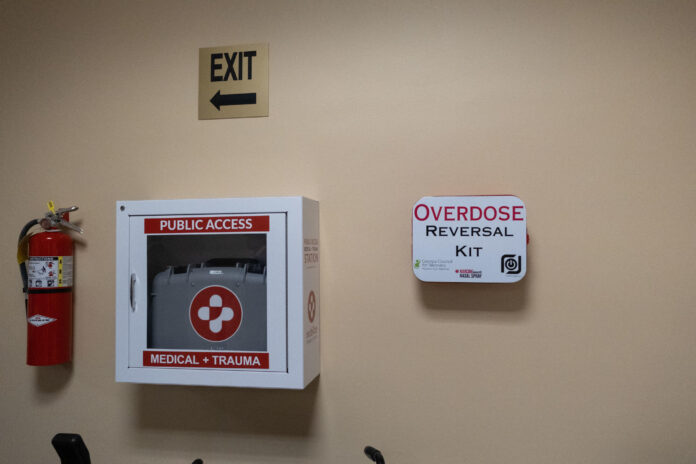
Vending machines carrying opioid-overdose reversal drugs are the center of a bill moving through the Georgia House that aims to make more drugs available to combat deaths from overdose.
House Bill 1035 aims to change Georgia’s law on the sale and distribution of drugs like opioid antagonists, which can be lifesaving during an opioid overdose. That’s important, considering deaths from synthetic opioids such as fentanyl have skyrocketed over the past few years and continue to rise nationally.
In Georgia, through 2022, the proportion of overdose deaths involving fentanyl has tripled.
Narcan, the most popular brand of naloxone, is free at multiple locations across the state, mostly from addiction and recovery groups but also local public health departments. The Federal Drug Administration made naloxone nasal spray available over the counter last spring.
But State Rep. Sharon Cooper, sponsor of HB 1035, said she wants to make opioid overdose reversal drugs, and not just Narcan, even more widely available. Cooper chairs the House Public Health Committee and is a member of the House Special Committee on Healthcare and Regulated Industries Committee.
As Georgia law stands, pharmacists can face misdemeanor charges if they distribute drugs like Narcan through vending machines. Cooper’s bill would protect pharmacists against these charges.
“Once we update this law, I think you will find probably vending machines on all our college campuses,” Cooper said.
So far, there’s one at Emory University’s Addiction Center. Sydney Wilkins, who represented the center at a hearing for the bill last week, said the university aims to expand its Narcan vending machine program across all of its three campuses, but that’s impossible to do unless permissions to fill the machines are expanded.
“We would rather have someone maybe taking too much, and us having a pharmacist have to routinely refill, than have an overdose,” said Wilkins.
“The anonymization of the access actually is a huge improvement in access because we realize that opioid addiction and opioid use is stigmatized,” Rep. Michelle Au said.
House Bill 1035 received unanimous favorable votes from committee members.
Cooper said her bill would also give Georgia’s public health commissioner the go-ahead to approve similar drugs over the counter, like the lesser-known nalmefene and naltrexone, by changing language in Georgia’s code to green-light the distribution and use of “any opioid antagonist.”
“Narcan is not the only one,” Cooper said. “Now we have drugs that are coming out to have a longer half-life.”
When someone is given nalmefene, for example, the drug stays in their bloodstream an average of nine hours longer than naloxone. The FDA approved nalmefene nasal spray only with a prescription last year. However, anecdotal evidence suggests it may result in stronger withdrawal symptoms once the drug wears off, giving some recovery advocates pause.
With all opioid antagonists, health care and emergency service providers say it’s necessary to stick by the person who received a dose for at least a few hours after.
This article appears on Now Habersham in partnership with GPB News







